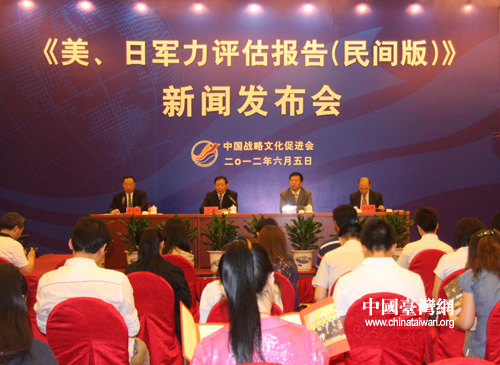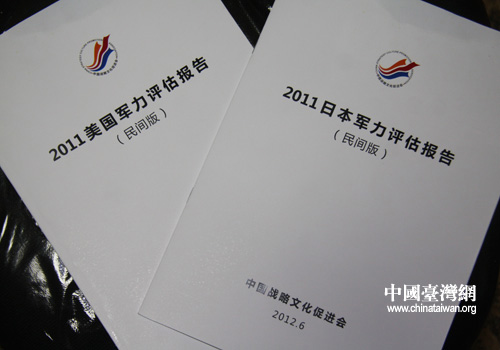Luo Yuan’s US-style military report, and difficulties for Dai Xu
Posted: July 20, 2013 Filed under: PLA & PLAN, Weibo | Tags: China Strategy Culture Promotion Association, Chinese army propaganda, 罗援, 罗援少将, Dai Xu, external propaganda, 龙韬, Long Tao, Luo Yuan, PLA, PLA political work, propaganda, Taiwan Affairs Office, Weibo, 戴旭, 中国战略文化促进会 1 Comment
Press conference launching China Strategy Culture Promotion Association’s 中国战略文化促进会 2011 reports on US and Japanese military developments
Here is an actual weblog post — a log of what one reads on the internet — rather than the usual rambling speculative essay.
Luo Yuan’s think tank, the “China Strategy Culture Promotion Association” (中国战略文化促进会), yesterday released separate reports on the “military power of the US and Japan”.
Curiously, given it’s supposedly an non-governmental think tank (民间智库), the Global Times quoted China Foreign Affairs University’s Su Hao calling the reports “strong and timely responses to the inaccurate remarks in the US annual report on China’s military and the Japanese Ministry of Defense’s recent white paper” (emphasis added).
The report has been given lots of coverage in the Chinese-language media. Chinese radio bulletins yesterday were reporting on the report before it was even released.
The radio also mentioned that this year’s reports will be issued in English. I hope this is true, because it looks to be packed with highlights:
The reports pointed out that neither the US nor Japan had enough transparency regarding their military budgets.
[…]
The report concluded that Japan has strengthened its defense in its southwest islands and was preparing to take over the Diaoyu Islands by force in the future and intervening in any potential conflict in the Taiwan Straits.
Luo Yuan himself was quoted:
“We need to prepare for the worst [situation],” Luo said, adding that China should be well equipped.
This is the second year the think tank has released these reports. Copies of last year’s report carried the term “public version 民间版” on the cover, as pictured at the top, which seems to suggest there also exists some kind of restricted-circulation government version. If so, the China Strategy Culture Promotion Association looks like a good analogue of Luo Yuan’s own roles, at the intersection of military intelligence gathering, public diplomacy, propaganda work, and Taiwan affairs.
Note the watermark on the above pictures, which are taken from the think tank’s own website here. Chinataiwan.org is a website of the PRC State Council Taiwan Affairs Office, which Luo Yuan’s father Luo Qingchang directed in the 1970s and early 1980s.
* * *
I stumbled across a couple of rather astonishing little Dai Xu tidbits a couple of weeks back.
1.) According to China Intellectual Property News, Dai Xu sued a Hong Kong magazine Wide Angle Lens《广角镜》 and others including a Beijing airport newsagent, for lifting 52% of the 2011 Long Tao article calling for a South China Sea war. He demanded withdrawal of the magazine from circulation, apologies, compensation of ¥200,000. Judgement was handed down in January this year. He was awarded……wait for it…….¥240.
Among other things, i guess this shows Colonel Dai is not that well-connected.
2.) A sharp-witted blogger has outed Dai Xu for writing a preface, under his penname “Long Tao”, to his own chapters, in a book edited by him. Of one Dai Xu chapter, “Long Tao” asserts that “this piece can be called the modern-day Strategies of the Warring States 《战国策》” and that “Dai Xu has continued his consistent style of speaking the truth . . . on national strategy, Dai Xu’s viewpoint is deafeningly clear, and manifestly superior”. In the other self-preface, Long Tao says the following article “will receive the support of the majority of Chinese people and Chinese military personnel . . . an incomparably correct position . . . nobody has ever explained important theoretical problems so clearly, correctly, reasonably and vividly”.
Here we see essentially the same self-wumao tactic as Luo Yuan got caught employing on weibo a few months back. A post appeared on Luo’s weibo account, praising Luo Yuan’s superb analysis of the North Korean problem, and declaring him “the most popular military commentator on television”.
The Major General claimed he claimed his account had been hacked, but Kai-fu Lee certainly wasn’t buying it. He did, however, offer Luo some expert advice: “Although you can use different browsers to operate multiple weibo accounts, the premise is that each browser must be logged into a different account!”
A “strategic communication” with India, via Luo Yuan?
Posted: July 6, 2013 Filed under: Academic debates, China-India, PLA & PLAN | Tags: AK Antony, Chinese military, diplomacy, hawkish faction, Indian media, Luo Yuan, military political work, PLA, PLA hawks, political warfare, PRC-India, Sino-Indian relations, strategic communication Leave a comment
Luo Yuan meets the press, July 4, 2013 – photo by Ananth Krishnan
To those people who subscribe to this blog via email, thankyou and i’m sorry — you guys always miss out on various additions and clarifications (e.g. headings, signpost & summary sentences) to the shoddy initial versions i post. If you’re interested in the topics but find my chaotic writing confusing, i’d always recommend waiting a few hours and then viewing via the web, rather than email.
If it wasn’t clear, the point of yesterday’s typically unwieldy post was actually quite simple: Luo Yuan, and the other “hawks”, are probably in the game of military political work, rather than policy competition.
With impeccable timing, Luo Yuan has provided a lovely example to illustrate this. [UPDATE JULY 8: Not really an example at all, it turns out.]
On Thursday, only hours before AK Antony arrived in Beijing for the first visit by an Indian Defense Minister for seven years, Luo held a press briefing and told India to be “very cautious in what it does and what it says.” [UPDATE: The briefing was not about India, and Luo only commented on India when asked by a journalist to do so. I have been told Luo made no attempt to raise the topic of India. Thus, the working hypothesis this piece was written under — that this was a carefully timed piece of strategic communication aimed at India — is invalid. It was almost certainly just a coincidence that Luo commented on India just before the Defense Minister’s visit. However, this doesn’t diminish the likelihood that Luo Yuan is in the business of political communication, only that this particular action was targeted at India.]
Major-General Luo Yuan’s “real and fake” dove-hawk opera
Posted: July 5, 2013 Filed under: Academic debates, China's foreign relations, Diaoyu, Global Times, PLA & PLAN | Tags: CCP-PLA, Chinese foreign policy, Chinese military, Chinese nationalism, Chinese strategy, 环球时报, Dai Xu, dovish faction, 钓鱼岛, Global Times, hawkish faction, Hu Jintao, Huanqiu Shibao, Luo Yuan, PLA hardliners, PLA hawks, PLA-CCP relations, Romance of the Three Kingdoms, Sinocism, Wang Hongguang 5 CommentsAs usual, I should be doing other things, but i couldn’t let this pass into the shadows: a chat session between Major-General (Retd) Luo Yuan and netizens from Huanqiu Wang (Global Times Website) in which Luo says the PRC’s debates between hawkish and dovish factions are “mixture of truth and deceit, real and fake”.
An English-language summary of the exchange was published on Chinascope in May, but that excluded many interesting parts, including, crucially, the ending. The more i read through the original, in fact, the more it seemed that just about everything in the article was pertinent.
.
Luo Yuan’s hopes for the masses
It starts almost exactly where i left off in this previous piece, discussing the strong market appeal of the PLA’s “hawkish” academic corps. The Huanqiu transcript claims to be a “actual record” of the chat, though the perfect, formal language the netizens allegedly used indicates that they were carefully vetted and edited. With questions prefaced by lines like, “Our country is currently situated in a period of complicated external circumstances,” we might legitimately wonder whether there were any netizens involved in the production of the questions at all.
Huanqiu netizen: China has always practiced peaceful coexistence, but in recent years our country has faced challenges everywhere in upholding territorial sovereignty. A significant number of the Chinese masses appeal for the coming of a “Flying General” from the poem line, “But when the Flying General is looking after the Dragon City / No barbarian horseman may cross the Yin Mountains.“[1] May I please ask, General Luo, how do you view these kinds of appeals?
“Flying General” refers to Li Guang 李广, the early Han Dynasty commander known for striking terror into the hearts of the Xiongnu raiders to the northwest. This raises a basic tension in China’s contemporary nationalist identity, between peaceful coexistence and merciless vengefulness and exclusion. Chairman Mao, of course, explained this away with his famous 1939 dictum, “If others do not assault me, I will not assault them; if others assault me, I will certainly assault them,” (人不犯我我不犯人,人若犯我我必犯人). Perhaps not surprisingly, that phrase became a slogan for destroying all kinds of real and fabricated enemies during Mao’s reign.
So, how does Luo Yuan view the masses’ alleged desire for a messianic “Flying General” figure to fight those fearsome Filipino raiders?





